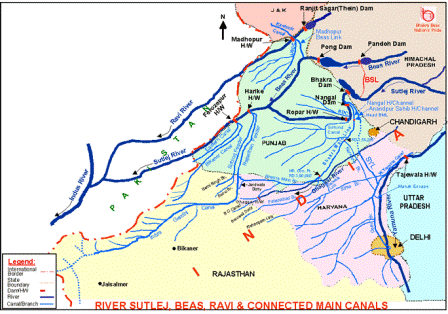J&K Urged To Increase Efforts To Improve Water Utilisation
Context:
The Union government gave orders to Jammu and Kashmir officials on Friday to step up efforts for “better utilisation of the country’s rights under the Indus Waters Treaty (IWT)” over the three rivers that run through the Union Territory.
Indus Waters Treaty
- The Indus Waters Treaty, which was signed in 1960 with the World Bank’s assistance, governs the distribution of water between India and Pakistan.
- The Indus River system, which runs through both countries, was the subject of a dispute resolution clause in the pact.
- The Indus Waters Treaty’s salient aspects are as follows:
- The Indus River system is split into three eastern rivers (Ravi, Beas, and Sutlej) that belong to India and three western rivers (Indus, Jhelum, and Chenab) that belong to Pakistan under the terms of the treaty.
- Water allocation: Under the terms of the treaty, India is allowed to use the waters of the three eastern rivers for a variety of uses, including hydropower generation, domestic usage, and irrigation. The waters of the western rivers belong exclusively to Pakistan.
- Permanent Indus Commission: The agreement creates the Permanent Indus Commission (PIC), which is made up of officials from both nations. In order to implement the treaty, exchange information, and settle issues, India and Pakistan work together and communicate more easily thanks to the PIC.
- Restrictions and protections: In order to guarantee an equitable distribution of water between India and Pakistan, the treaty sets a number of restrictions and safeguards. For instance, it limits India’s ability to store water on the western rivers and forbids interfering with the water’s flow to Pakistan.
- Dispute Resolution:The treaty contains clauses that specify how conflicts will be settled through discussion and arbitration. It establishes procedures for settling disagreements or arguments that can develop between the two nations on how to interpret or apply the treaty.
Points to Ponder:
- The Indian Union government has directed its representatives in Jammu and Kashmir to intensify their efforts to make use of the three rivers that run through the Union Territory under the terms of the Indus Waters Treaty (IWT).
- The special task force’s second meeting, which was held in Srinagar with the goal of ensuring that India’s rights under the IWT are effectively exercised, was presided over by Deputy National Security Advisor Sari Vikram Misri.
- During the conference, the status of several hydropower projects in Jammu and Kashmir was discussed.
- It was noted that great advancements had been made in relation to the hydro power projects on a number of fronts.
- The emphasis was on finishing all of the Indus Basin Projects’ work by the allotted deadlines.
- India would be able to use its rights under the Indus Waters Treaty more effectively if these projects were finished on schedule.
- Top authorities, including the Principal Secretary of the Power Development Department for Jammu & Kashmir, representatives from the Ministry of External Affairs, the Commissioner (Indus) of the Ministry of Jal Shakti, and other pertinent parties, attended the high-level meeting.
- Sari Vikram Misri, the deputy national security adviser, also met with Manoj Sinha, the lieutenant governor of Jammu and Kashmir, to provide him an update on the ongoing efforts to oversee the execution of hydropower projects in the Indus Basin.
- The Prime Minister’s Office is giving the go-ahead for these initiatives.
- In this national effort to make use of India’s rights under the Indus Waters Treaty, the Lieutenant-Governor pledged full cooperation.





